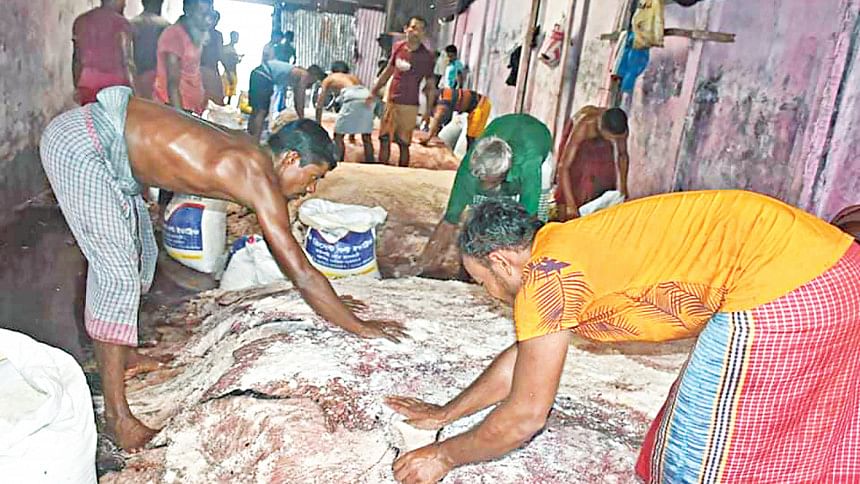Rawhide trade in Barishal only fetched losses this Eid

Rawhide collection saw a 30 per cent year-on-year drop this year in Barishal thanks to a drastic fall in the number of animals sacrificed during Eid-ul-Azha because of the coronavirus outbreak.
"Last year, we collected 65,000 pieces of cow skins during the Eid, which came down to 40,000 pieces this year," said Shahidur Rahman Shahin, secretary of the Barishal Hide and Skin Merchants Association.
Only 4,300 cows were sacrificed in the city this year, in contrast to 7,200 last year, said Rabiul Islam, conservancy officer of Barishal City Corporation.
The numbers of buyers and sellers were very thin this year in Chamarpatty and Padmabaty areas, a centre famous for rawhide trade in Barishal.
The animal skins were sold as per piece and not according to their sizes in square metres, according to Shahin.
A small cow's skin sold for Tk 200-250, the medium-sized ones at Tk 300-400 and the bigger ones at Tk 400 to 500, said Yusuf Ali, a regular rawhide trader of the market.
However, goat hide was sold at Tk 10 a piece and was even given away with the purchase of cowhide.
"My transportation cost is even higher than the price of the five goat hides I brought to sell," said Md Shahim, who came from Palashpur to the market.
He blamed the fall in rawhide numbers and sales on the outbreak of coronavirus, which hit hard the financial health of the general mass.
Capital crisis, a lack of incentives given by the financial institutions and the arrears that are yet to be paid by the syndicated tannery owners of Dhaka are also to blame, Shahim said.
Muslims mostly donate the rawhides of their sacrificed animals to the mosques and madrasas, which are later sold in the market and the money is used in the religious places.
But this year, the mosques and madrasas have failed to even recoup the labour and transportation costs they spent to collect the rawhides.
The buyers are offering prices as low as Tk 300 a piece, said Anwar Hossain, a teacher of a madrasa at Nabagram in Barishal Sadar, who came to the market with 250 skins of cows.
Abdur Razzak, another madrasa teacher of Natun Bazaar area of the city, said he had to sell the rawhides of 20 cows at prices hovering between Tk 200 to Tk 350.
"I have spent more on labour and transportations of the skins."
In 2014, each rawhide was sold at Tk 2,800 on an average.
This year, 13 people worked all day to collect 20 skins, from which Razzak fetched only Tk 7,000.

 For all latest news, follow The Daily Star's Google News channel.
For all latest news, follow The Daily Star's Google News channel. 



Comments